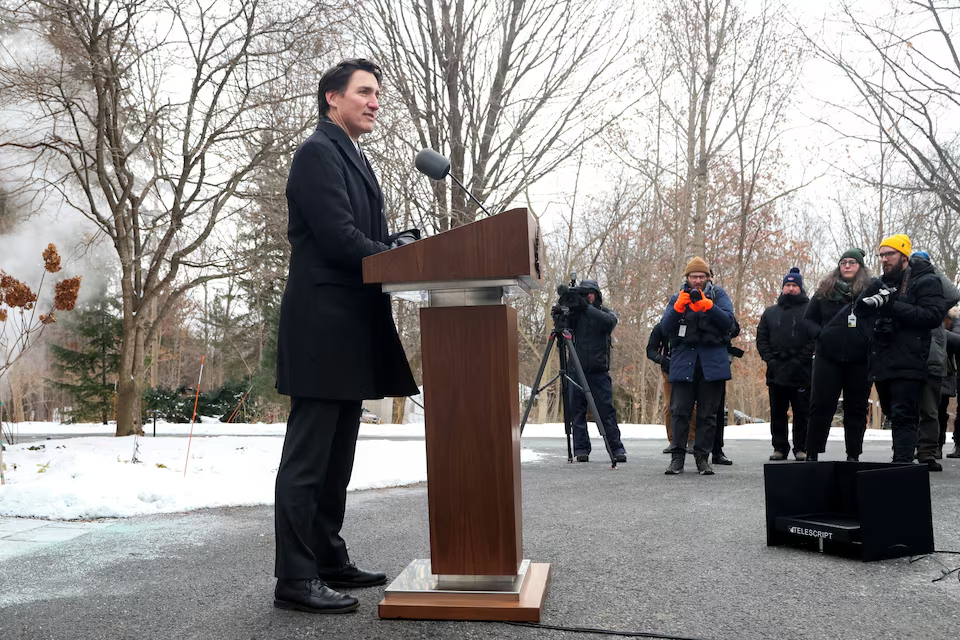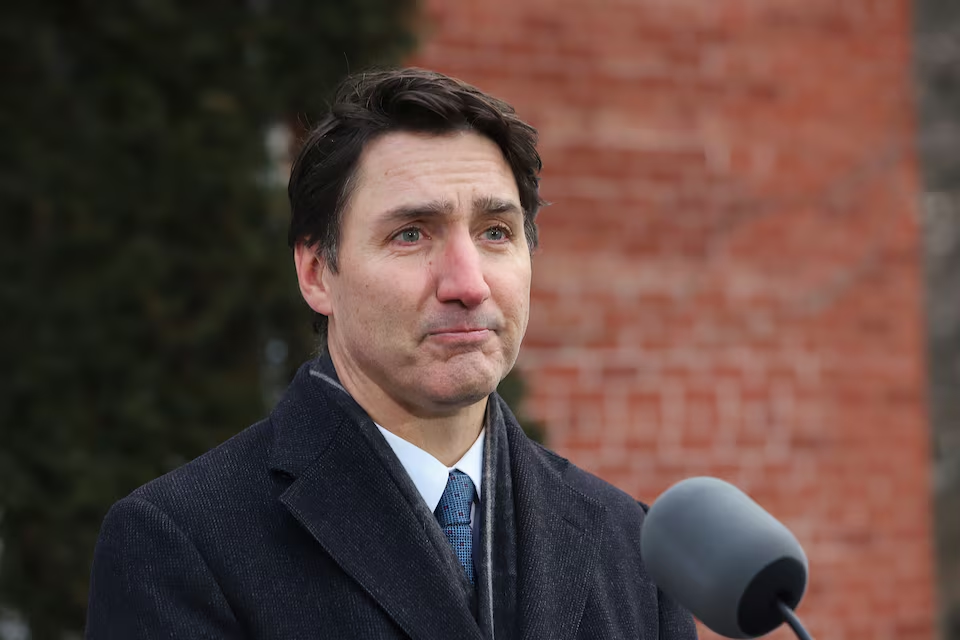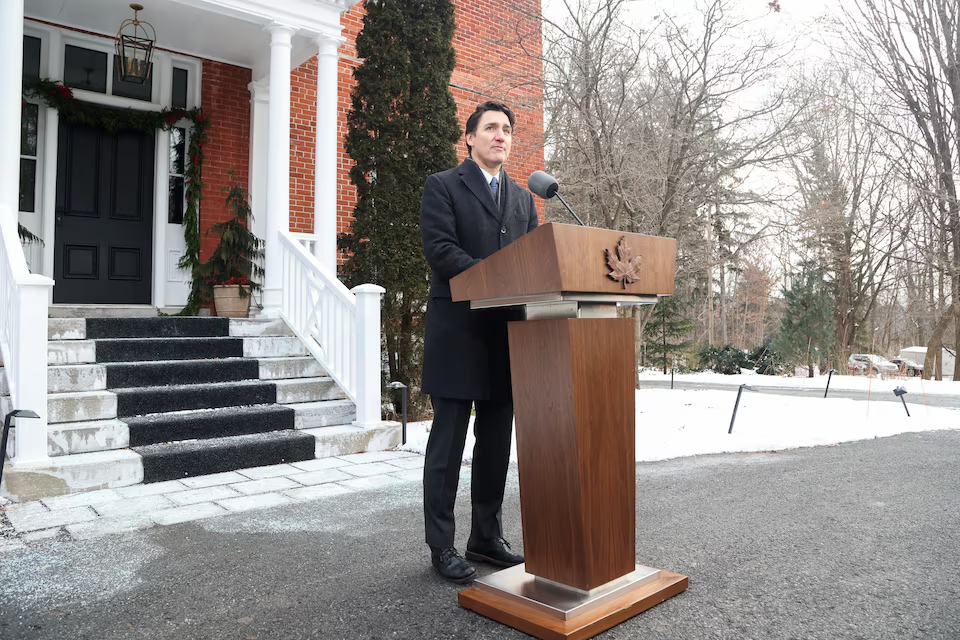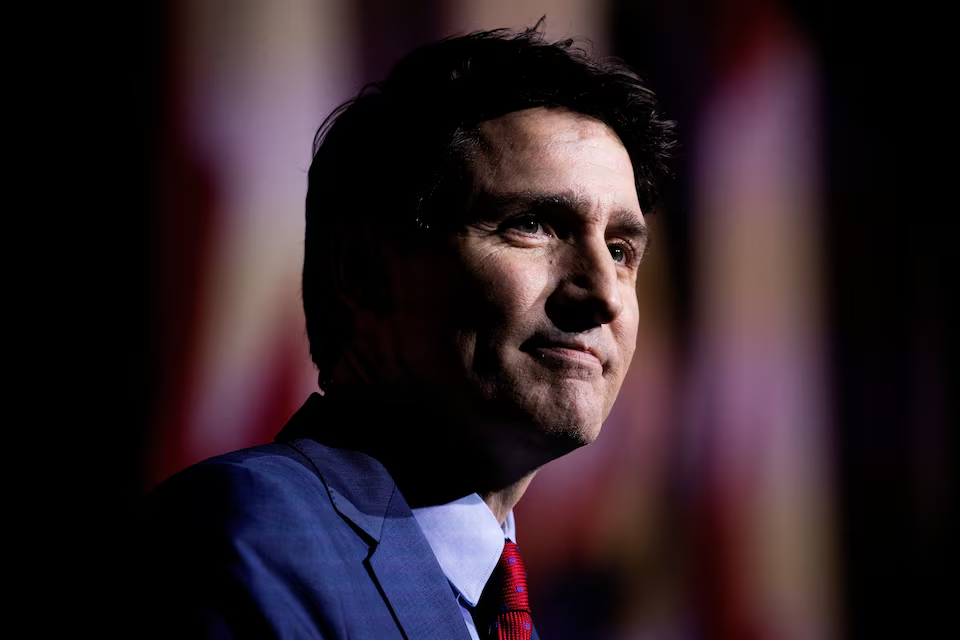Canadian Prime Minister Justin Trudeau on Monday said he would step down in the coming months after nine years in power, bowing to pressure from lawmakers alarmed by his Liberal Party's miserable showing in pre-election polls.
A subdued Trudeau, among the most prominent progressive leaders in the world, told a press conference that he would stay on both as prime minister and Liberal leader until the party chooses a new chief within months.
"This country deserves a real choice in the next election, and it has become clear to me that if I'm having to fight internal battles, I cannot be the best option in that election," Trudeau said.
He also announced parliament would be prorogued, or suspended, until March 24.
That means an election is unlikely before May at the earliest, so Trudeau will remain in charge - at least initially - of dealing with the threat of crippling tariffs once U.S. President-elect Donald Trump takes office on Jan. 20.
|
|
| Canada's Prime Minister Justin Trudeau speaks to reporters, announcing he intends to step down as Liberal Party leader, but he will stay on in his post until a replacement has been chosen, from his Rideau Cottage residence in Ottawa, Ontario, Canada, January 6, 2025. Photo: Reuters |
The next election must be held by Oct. 20 and polls show voters angry over high prices and a shortage of affordable housing will elect the opposition Conservatives and hand the Liberals a resounding defeat, no matter who leads the party.
In recent weeks unhappy Liberal lawmakers openly called on Trudeau to quit after his finance minister resigned and accused him of "political gimmicks" to win back voters.
"I am not someone who backs away from a fight, particularly when a fight is as important as this one is," Trudeau told reporters outside his residence as temperatures dipped to minus 15 degrees Celsius (5 degrees Fahrenheit).
"But I have always been driven by my love for Canada ... and it has become obvious to me with the internal battles that I cannot be the one to carry the Liberal standard into the next election.
'Fatigue factor'
Trudeau, 53, took office in November 2015 with a message of hope and "sunny ways" and won reelection twice, becoming one of Canada's longest-serving prime ministers and winning plaudits from progressives for his focus on gender parity policies.
But his popularity started dipping two years ago as prices of groceries and housing rose in the post-COVID period, and his fortunes never recovered.
An Ipsos Canada poll released on Dec. 22 showed the Conservatives had 45% support among decided voters, with the Liberals and the left-leaning New Democrats on 20% each. Such a result on election day would mean a huge Conservative victory.
 |
| Canada's Prime Minister Justin Trudeau speaks to reporters, announcing he intends to step down as Liberal Party leader, but he will stay on in his post until a replacement has been chosen, from his Rideau Cottage residence in Ottawa, Ontario, Canada, January 6, 2025. Photo: Reuters |
Parliament was originally due to resume on Jan. 27 and opposition parties had vowed to bring down Trudeau's minority government as soon as they could. But with parliament returning only on March 24, the earliest they could present a non-confidence motion would be some time in May.
Trudeau said he had asked the Liberal Party to set in motion a leadership contest but did not say how long it would take. A new party leader would become prime minister immediately, and lead the Liberals into the next election.
Shachi Kurl, president of pollster Angus Reid, said that while a new leader might be able to stem losses, the Liberal party was still in trouble.
"There is a fatigue factor. This is a government in its 10th year - at some point the milk just expires," Kurl said in a phone interview. "I think the milk has turned pretty sour."
Although proroguing parliament would allow the Liberals to choose a leader without worrying about an election derailing the process, the move could still hurt them with voters, said Philippe Lagasse, an associate professor and constitutional expert at Ottawa's Carleton University.
"I think people are ready for an election. They want to move on - this is just delaying it," he said.
Liberal infighting has alarmed business groups and the premiers of the country's 10 provinces, who say Ottawa has to focus on possible tariffs from the Trump administration.
"Canada needs to demonstrate stability and strength at this critical moment, and the federal government must urgently explain to Canadians how they will avoid tariffs that could have devastating effects," said Doug Ford, premier of Ontario, the most populous province.
Trudeau had until recently been able to fend off Liberal legislators worried about the poor showing in polls and the loss of safe seats in two special elections last year.
But calls for him to step aside soared since last month, when he tried to demote Finance Minister Chrystia Freeland, one of his closest cabinet allies, after she pushed back against his proposals for more spending.
Freeland quit instead and penned a letter accusing Trudeau of "political gimmicks" rather than focusing on what was best for the country.
|
|
| Canada’s Prime Minister Justin Trudeau speaks at the federal Liberal caucus holiday party, the day after Finance Minister Chrystia Freeland unexpectedly resigned, in Ottawa, Ontario, Canada December 17, 2024. Photo: Reuters |
Freeland and former central banker Mark Carney, two potential candidates in the race to replace Trudeau, both issued short statements thanking him for his service.
The Conservatives are led by Pierre Poilievre, a career politician who rose to prominence in early 2022 when he supported truck drivers who took over the center of Ottawa as part of a protest against COVID-19 vaccine mandates.
"While leaderless Liberals focus on saving their jobs and fighting each other for power, the country spirals out of control," Poilievre said in a statement, reiterating calls for an immediate election.
Trump reacted to Trudeau's announcement by repeating earlier comments that Canada would gain from becoming the 51st U.S. state and complaining about Canada's trade surplus with the United States.
"The United States can no longer suffer the massive Trade Deficits and Subsidies that Canada needs to stay afloat. Justin Trudeau knew this, and resigned," he said on Truth Social.






















































